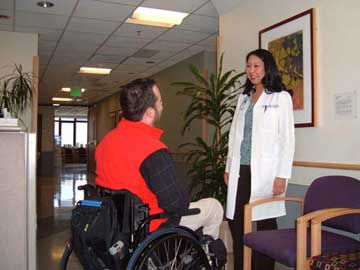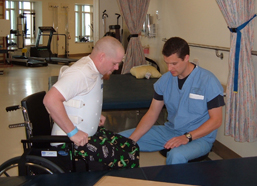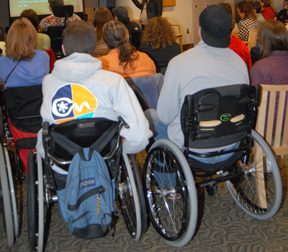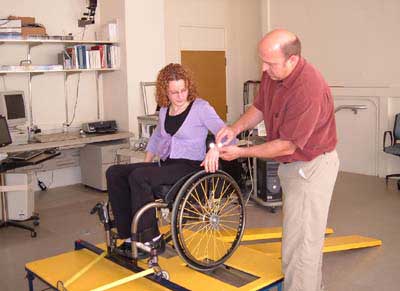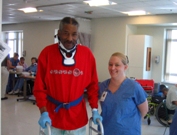Spinal Cord Injury Update
Spring 2009: Volume 18, Number 1
In their own words
Stories—and advice — from people living with chronic SCI pain
I started having pain about six months after injury. The pain feels like burning, pins and needles, and electric shock. A lot of activities trigger it, but nowadays it’s constantly there, 24/7. If I had to rate it on a scale from 1–10, it would be 4–5 on a typical day and definitely an 11 on sleepless nights.
I have tried many things over the years (acupuncture, Chinese herbal medications, tai-chi, martial arts (punching bags), breathing techniques) but what seems to work is morphine, neurontin and trileptal, along with constantly keeping my mind busy. Everyone’s pain is different, even though we might have similar injuries. Keep exploring all possibilities.
—34-year-old male; T4;
injured 5 years
I have neuropathic pain all of the time. At one point my pain was much worse than it is now and not managed well at all, to the point of causing personality changes. It made me more agitated and on edge, constantly looking out for potential pain sources.
I think I have tried practically every drug there is for neuropathic pain. The thing that made the greatest change for me was switching to the antidepressant sertraline (Zoloft). This likely had a compounding effect of changing my perception of pain psychologically as well as reducing the physiological pain signals.
My advice: Try different things! Try switching or starting an antidepressant; that made the biggest difference for me. I’ve been through half a dozen or so, and when I finally arrived at one that worked for me it made a big difference. Also, don’t let it get you down or stop you from doing the things you want. It’s easy to fall into your own little world and feel alone—after all, pain is a lonely suffering. Watch out for that and seek out positive ways to deal with your pain to a point where it’s not controlling who you are.
—25-year-old male; C5; injured 6 years
I have neuropathic pain in my back and sometimes it shoots down my legs like electricity. I have learned to block out the pain in my mind and to calm myself, plus I do take pain medication like codeine. The calmer I am, the less pain I have. It can be hard to explain to people and in some instances I believe people have thought I was making it up because they can’t understand how I can have pain in my legs when I can’t feel my legs.
—32-year-old female; T5/6; injured 15 years
I have neuropathic pain pretty much 24/7. On a 1–10 scale the average is 7. What triggers the pain is mostly a mystery, but it is made worse by stress, constipation, having to sit still or in one place for more than 10 minutes, and urinary tract infections.
I try to keep as busy as possible, listen to my favorite music loud. I take neurontin, but it doesn’t help that much. I practice relaxation techniques. Sometimes massage helps. My advice: Keep busy. Distract yourself from the pain as much as possible. Seek support from others with the same issue.
It’s a good idea to find yourself a good psychologist who has worked with chronic pain patients. Chronic pain can make you very depressed and can overwhelm your life. Cognitive methods like self hypnosis, breathing and relaxation exercises and the use of imagery can help.
—58-year-old female; T10/11;
injured 13 years
I have pain all the time, located in the legs and bladder. Typical pain triggers are stress, dehydration and bladder incontinence. I use baclofen, neurontin, acupuncture, swimming, and even mind games –imagining the pain doesn’t exist – to deal with pain. My advice: Learn to accept it; it gets easier. Try acupuncture; relax.
—28-year-old male; T10;
injured 2 years
I have pain constantly. The intensity varies. Location is in the legs, lower and upper back and neck. It is triggered by temperature, touch, vibration and wrinkled clothing. I have a baclofen pump with a combination of morphine and baclofen.
—44-year-old male; C5; injured 10 years
I’ve come up with some basic techniques that help to decrease the pain. Many are just distractions or mind over matter, but I think I’ve trained myself to know (or believe) that they help.
One thing I do when I’m experiencing pain is take deep breaths and then slowly let them out. I imagine breathing into the area on my body where the pain is concentrated. This is both distracting and relaxing. Sometimes I will just rub the area where the pain is, like rub my hands down my thighs. It feels like I’m pushing the pain out.
It’s hard sometimes to be rational because pain can affect nearly everything in day-to-day life but this is a situation (battle) where attitude and perspective really can be a useful part of your arsenal. This could be where a therapist might be helpful.
— 52-year-old female; T12;
injured 27 years

